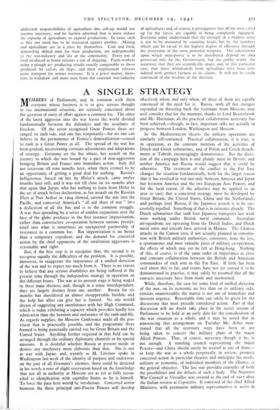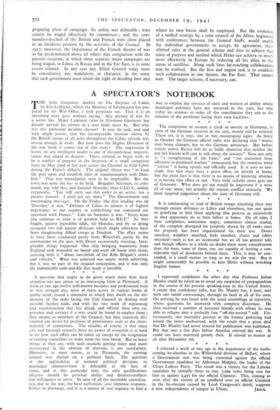A SINGLE STRATEGY
MEMBERS of Parliament, and in common with them everyone whose business it is to give serious thought to tne international situation, are seriously concerned about the question of unity of effort against a common foe. The entry of the latest aggressor into the war leaves the world divided fundamentally between the defenders and the assailants of freedom. Of the seven recognised Great Powers three are ranged on each side, and one has temporarily—for no one can believe in the permanence of France's demoralisation—ceased to rank as a Great Power at all. The spread of the war has been gradual, necessitating constant adjustments and adaptations of strategy. Germany set the fire ablaze, her assault on the country to which she was bound by a pact of non-aggression bringing Britain and France into immediate action. Italy did not intervene till nine months later, when there seemed to be an opportunity of getting a good deal for nothing. Russia's belligerence, forced on her by Hitler's attack, came twelve months later still, and it was not till close on six months after that again that Japan, who has nothing to learn from Hitler in the art of attack before declaration, as her assault on the Russian Fleet at Port Arthur in 1904 showed, carried the war into the Pacific, and converted America's " all aid short of war " into a dedication of all she has and is to the common struggle. A war thus spreading by a series of sudden expansions over the face of the globe produces in the first instance improvisation, rather than constructive co-operation between nations precipi- tated into what is sometimes an unexpected partnership of resistance to a common foe. But improvisation is no better than a temporary expedient, and the demand for concerted action by the chief opponents of the totalitarian aggressors is reasonable and right.
But, if the first step is to recognise that, the second is to recognise equally the difficulties of the problem. It is possible, moreover, to exaggerate the importance of a unified direction of the war and to expect too much from it. There is no reason to believe that any serious disabilities are being suffered at the present time through the independent strategy in operation on the different fronts. The war at its present stage is being waged in three main theatres, and, though in a sense interdependent, they are largely distinct from one another. Russia for six months has shouldered an almost insupportable burden, and the help her allies can give her is limited. No one would dream of suggesting any interference with her High Command, which is today exhibiting a capacity which provokes hardly less admiration than the heroism and endurance of the rank-and-file. As regards supplies, the Moscow Conference made all the pro- vision that is practically possible, and the programme there framed is being punctually carried out by Great Britain and the United States. Anything further required in that field can be arranged through the ordinary diplomatic channels or by special missions. It is doubtful whether Russia at present needs or desires any machinery more elaborate than that. She is not at war with Japan, and, warmly as M. Litvinov spoke in Washington last week of the identity of purpose and endeavour on the part of all Germany's enemies, there could be detected in his words a note of slight reservation based on the knowledge that not all in authority at Moscow are as yet as fully recon- ciled to idensification with capitalist States as he is himself. To force the pace here would be injudicious. Concerted action between the three principal anti-Fascist Powers will develop effectively when, and only when, all three of them are equally convinced bf the need for it. Russia, with all her energies expended on thrusting back the Germans from Moscow, may well consider that for the moment, thanks to Lord Beaverbrook and Mr. Harriman, all the practical collaboration necessary has been achieved,—though, in fact, important talks are actually in progress between London, Washington and Moscow.
In the Mediterranean theatre the military operations are similarly self-contained. Practical collaboration, it is true, is in operation, as the constant mention of the activities of Dutch and Greek submarines, and of Polish and Czech detach- ments at Tobruk, encouragingly demonstrates. But the direc- tion of the campaign here is and plainly must be British, and neither America nor Russia would suggest that it could be otherwise. The extension of the conflict to the Far East changes the situation fundamentally, both for the larger reason that it has resulted in war not only between America and Japan but between America and the two European Axis Powers, and for the local reason (if the adjective may be applied to an area so vast) that a concerted strategy must be developed by Great Britain, the United States, China and the Netherlands, and perhaps later Russia, if the Japanese assault is to be suc- cessfully repelled. Something of that is in existence already. The Dutch submarines that sank four Japanese transports last week were working under British naval command. Australian air-squadrons are operating from the Dutch Indies, and Dutch naval units and aircraft have arrived in Malaya. Th. Chinese attacks in the Canton area, if not actually planned in consulta- tion with British military authorities, constitute, none the less, a spontaneous and most valuable piece of military co-operation, the effects of which may yet be felt at Hong-kong. Nothing of this, of course, is of the same order of importance as close and constant collaboration between the British and American commanders of each arm in the Far East. If little has been said about this so far, and events have not yet caused it to be demonstrated in practice, it may safely be assumed that all the contacts necessary have been made and maintained.
While, therefore, the case for some kind of unified direction of the war, on its economic no less than on its military side, remains unanswerable, the matter is not one of immediate and insistent urgency. Reasonable time can safely be given for the discussions that must precede considered action. Part of that discussion will no doubt take place in the secret session of Parliament to be held at an early date for the consideration of the war situation as a whole, and it may be noted that in announcing that arrangement on Tuesday Mr. Attlee men- tioned that all the necessary steps have been or are being taken to concert the military plans of the major Allied Powers. That, of course, necessary though it be, is not enough. A standing council representing the major Powers—and China should surely be treated as one of them— to keep the war as a whole perpetually in review, promote concerted action in particular theatres and anticipate the needs, military or economic, of individual members of the alliance, is the general objective. The last war provides examples of both the possibilities and the defects of such a body The Supreme War Council at Versailles was created at the end of 1917 after the Italian reverse at Caporetto. It consisted of the chief Allied Ministers, with permanent military representatives to assist in preparing plans of campaign. Its utility was debatable ; wars cannot be waged effectively by committees ; and the com- manders-in-chief of the British and French were often placed in an invidious position by the activities of the Council. In 1917, moreover, the importance of the French theatre of war so far predominated above all others that comparison with the present situation, in which three separate major campaigns are being waged, in Libya, in Russia and in the Far East, is to some extent vitiated. In any case any Allied Council today must be consultative, not mandatory, in character, in the sense that each government must retain the right of deciding how and where its own forces shall be employed. But the evolution of a unified strategy by a joint council of the Allies, beginning with conferences between the General Staffs, would enable the individual governments to accept, by agreement, their allotted roles in the general scheme and thus to achieve that unity of purpose and method which Hitler can achieve so much more effectively in Europe by reducing all his allies to the status of satellites. Along such lines far-reaching collaboration may be evolved. But the first and urge& task is to establish such collaboration in one theatre, the Far East. That cannot wait. The larger scheme, if necessary, can.























 Previous page
Previous page